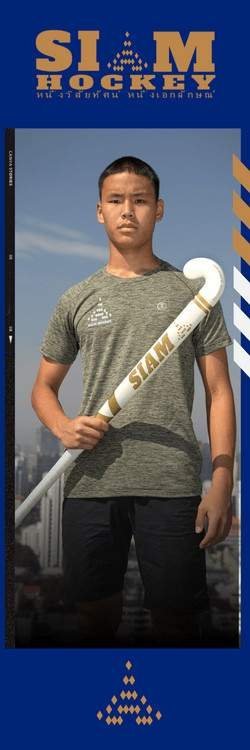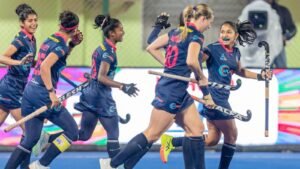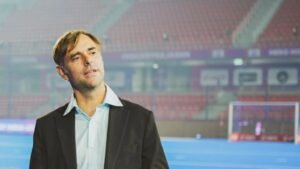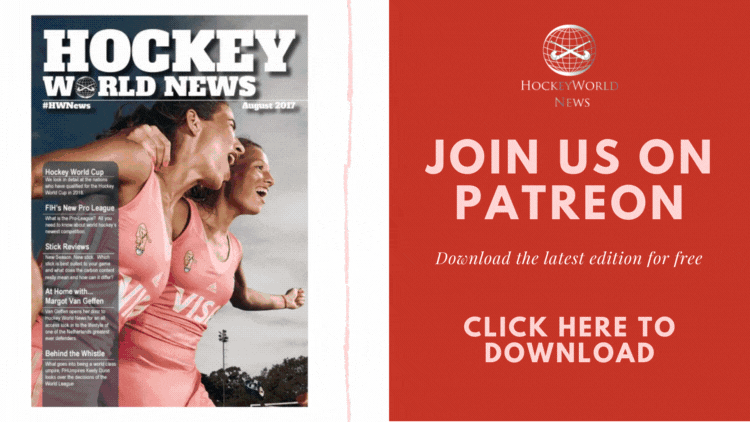Twenty-five years ago, the Netherlands was the promised land for Scottish-born Laurence Docherty (45), the field hockey heaven where he chased his dream. He settled down at Klein Zwitserland, met the love of his life there, had himself naturalized as a Dutchman and wore the Orange shirt at the 2008 Olympics in Beijing. Now he is back where it all began, as coach of Men’s 1.
With his right hand, the former midfielder points from the wooden benches near the main field to Klein Zwitserland’s clubhouse: the black, wooden chalet, which seems plucked straight from a mountain village in the Alps. It is not the most modern, but certainly the most charming clubhouse in the Tulip big league. When Docherty arrived here in 2000, it was already there, and twenty-five years later it still stands. ‘Where else do you see this?” he says, his eyes shining. ‘A clubhouse with so much character. To me, this feels like home.’
Soccer coach Louis van Gaal said on his return to Ajax in 2003 that it had come full circle. That same feeling must now come over Docherty upon his return to the old nest. Klein Zwitserland is not only the club where he made his breakthrough as a field hockey player, but also where he found solid ground in his private life.
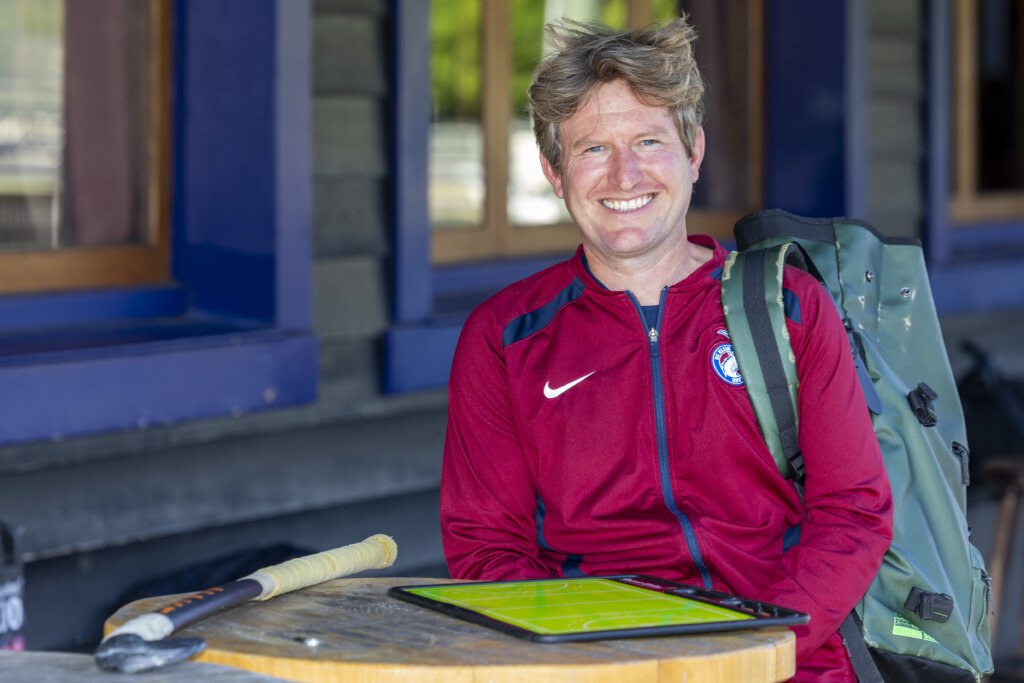
After eighteen years, Laurence Docherty returned to the old nest this summer as coach of Men’s 1. Photo: Willem Vernes
I was picked up from Schiphol Airport by Hans Streeder, who was assistant at the time. In the car he kept talking to me in Dutch. I didn’t understand a word of it. Laurence Docherty on his arrival in the Netherlands, in 2000
Docherty was born in Edinburgh. He played rugby as a child, but field hockey eventually attracted him the most. He played 48 international matches for Scotland and dropped out of Great Britain’s Olympic selection at the last minute in 2000. Then he took the plunge to the Netherlands. The day he arrived here is still etched in his memory: Aug. 17, 2000.
‘I was picked up from Schiphol Airport by Hans Streeder, who was my assistant at the time. In the car he kept talking to me in Dutch. I didn’t understand a word of it. Before I knew it, I was in the middle of a kind of sightseeing tour to The Hague,’ Docherty says, laughing, with an accent that has lost its sharp Scottish edges over the years. Somewhere you can still hear that he is not a native Dutchman, but the long, Scottish vowel sounds have worn off by now.
When he thinks back to his time with Klein Zwitserland (2000-2007), a smile immediately appears on his face. He talks about it as if it was his first great love: “It was fantastic. I came into a very warm bath. My teammates took me in tow from day one. Almost all young guys, who welcomed me with open arms, spoke perfect English and taught me Dutch. The club was swarming with kids, all equally sweet.’
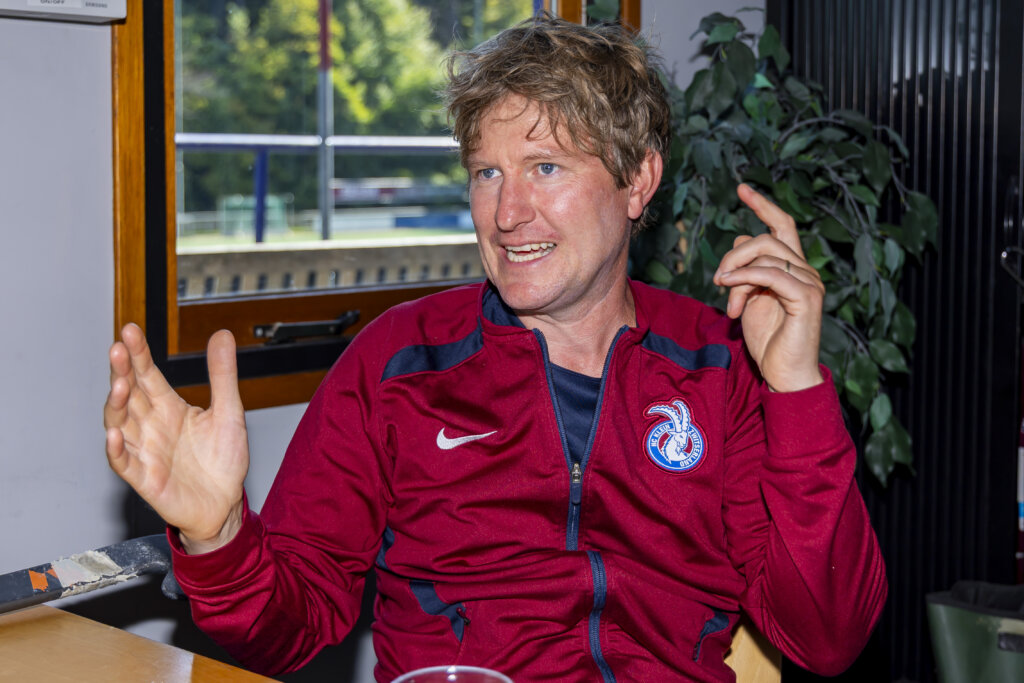
Enthusiastic Laurence Docherty talks about his return to Klein Zwitserland. Photo: Willem Vernes
He met his dream woman and had himself naturalized as a Dutchman
It was a different time than now. The golden years with eight national titles in a row (1977-1984) may have belonged to the distant past, but the Steenbokken were still at the top. Coach Joost Bellaart, the architect behind five of the eight national titles, was in his second term when Docherty arrived. Max Caldas, with whom Docherty shared an apartment, was the experienced routinier. International Taeke Taekema the dreaded penalty-corer canon.
‘We reached the playoffs three times. Around 2002 we made a serious attempt to bring Teun de Nooijer to KZ. But in the end he chose to stay with Bloemendaal. Had he opted for us, we would have undoubtedly competed seriously. In 2005 Taeke left for Amsterdam and it slowly became less and less,’ Docherty looks back. ‘You don’t even have to listen closely to hear how much the club’s fall affected him. In 2007, Klein Zwitserland was relegated, the moment for Docherty to close the book after seven years. He made the move to top club Bloemendaal, with whom he won the national title in 2008, 2009 and 2010.
Klein Zwitserland meant more to him than just field hockey. There he laid the foundation for the rest of his life. There he met his dream woman, with whom he now has three sons, aged nine, six and three. He had himself naturalized as a Dutchman and made the move to the Dutch national team. He reached 78 international matches, including playing the 2008 Olympics in Beijing (fourth).
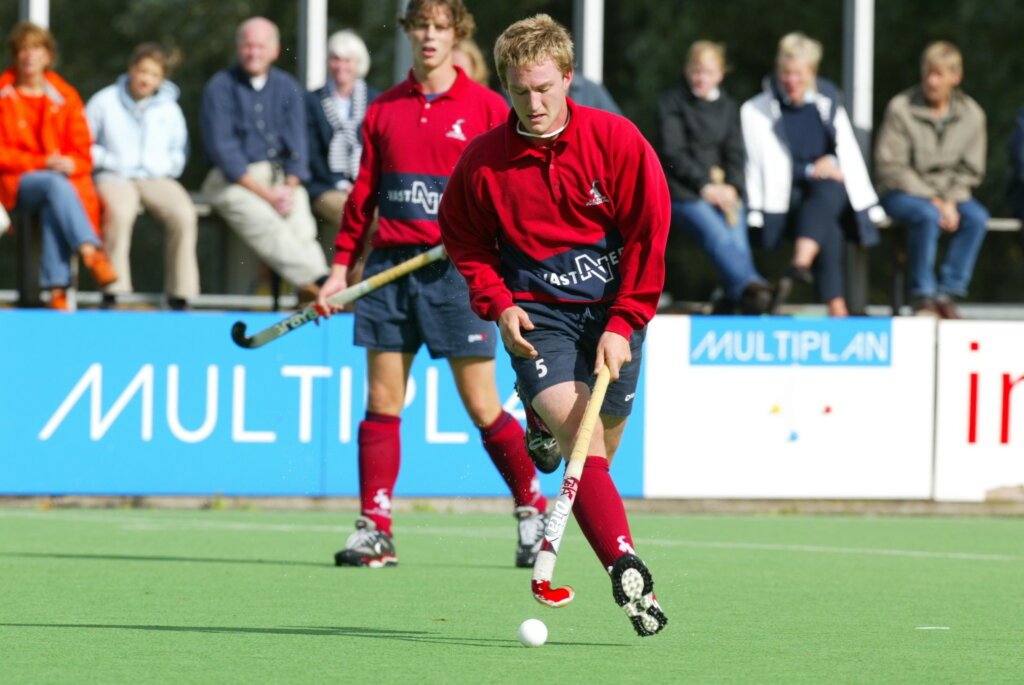
For seven years Laurence Docherty played for Klein Zwitserland (2000-2007). Photo: KNHB
It was actually not my plan at all to be on the field as a coach again. Still, there were a few clubs I wanted to make an exception for. KZ was on top. Laurence Dochterty
This summer, eighteen years after he left, his old love unexpectedly knocked on his door again. ‘It wasn’t actually my plan at all to be on the field again as a coach. I coached Bloemendaal’s men for one season and stood along the line at HBS for two years. But that’s been a while back now. I was actually in the middle of another chapter of my life. Still, there were a few clubs I wanted to make an exception for. KZ was at the top.
After an eventful season with Robert Justus, who left just before the end, a new era should begin under Docherty’s leadership. Last season the focus was mainly on defending. At the back, the organization was solid: with only 52 goals against, Klein Zwitserland even managed fewer than Oranje-Rood, which finished two places higher, sixth. But offensively, with 36 goals, KZ brought too little. Germany’s top striker Marco Miltkau – in the meantime left for Bloemendaal – was mainly on his own 23-meter line, far away from his hunting ground: the circle. Too little did the home crowd get to see the attacking field hockey they love at Klatteweg.
Docherty: ‘At the back it was fine. The structure was in place, the agreements were clear. We will build on that basis, but we will tinker with a few things. It could be a bit bolder, I think. If we don’t take risks, we will never come close to their circle. I want to see attacking field hockey, line by line. Of course, defending is still important. But the starting point is: how do we score goals?’
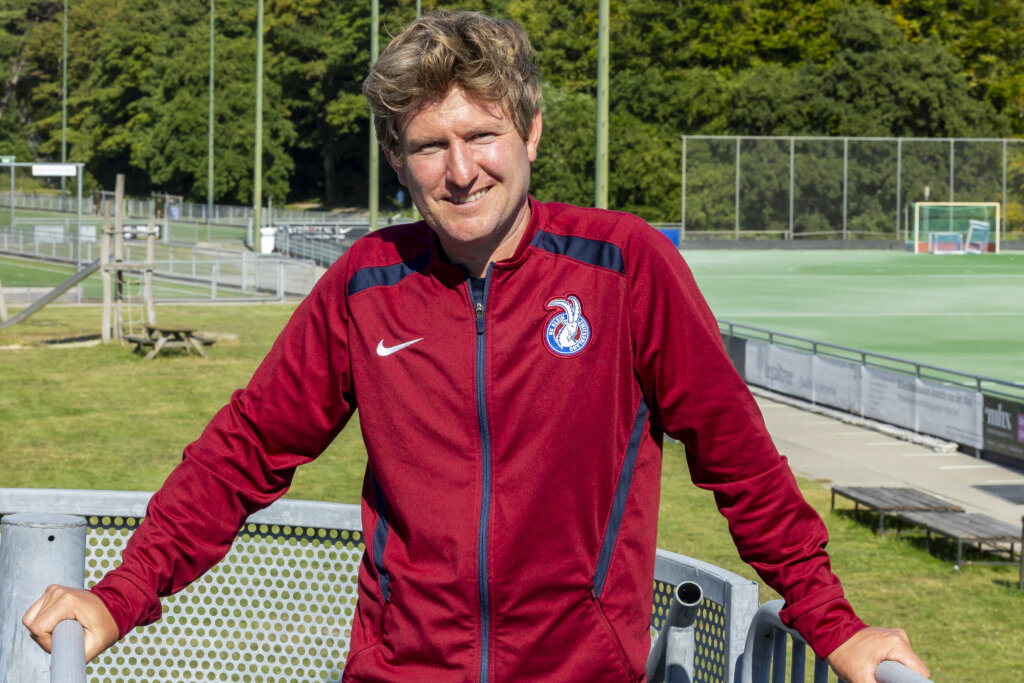
As a coach, Docherty wants to see attacking field hockey. Photo: Willem Vernes
‘Other guys have to step forward now’
The key question, of course, is whether Klein Zwitserland can carefully measure up to the top again next season. But quite a few face determining players have left: Marco Miltkau (Bloemendaal), Matthew Swann (Australia), Lucas Middendorp (Amsterdam), Albert Béltran (Australia) and Nick van Trigt (Rotterdam). Eight new faces, including Argentine Joaquin Toscani and Germans Tom Schneider and Linus Michler, made their entrance. Also notable is the arrival of Jochem Bakker, who did not get to play much at Rotterdam last season.
Swann was really a special player. You don’t just replace him. But I also look at what we do have in terms of player material,’ says Docherty. We have young guys who now get the chance to take steps. And there are guys with more experience who now have to step forward. Show leadership, take initiative. THIS is the time to step up. Then maybe this is the beginning of something beautiful.’
by Hockey.nl


